| کد مقاله | کد نشریه | سال انتشار | مقاله انگلیسی | نسخه تمام متن |
|---|---|---|---|---|
| 3972171 | 1256794 | 2009 | 7 صفحه PDF | دانلود رایگان |

The use of gonadotrophin-releasing hormone (GnRH) agonists for triggering ovulation remains controversial. The primary objective of this study was to evaluate the incidence of ovarian hyperstimulation syndrome (OHSS) following GnRH agonist versus recombinant human chorionic gonadotrophin (HCG) as methods for triggering ovulation. A second aim was to compare the clinical outcome and embryo quality according to the two procedures. The cycle characteristics of 100 oocyte donors undergoing ovarian stimulation and IVF outcomes of their 100 oocyte recipients were analysed. Donors were prospectively randomized into two groups on the last day of ovarian stimulation: Group I received a single bolus of 0.2 mg of triptorelin and Group II received 250 μg of recombinant HCG. No differences were observed in the number of oocytes retrieved or in the proportion of metaphase II oocytes between the groups. The OHSS rate was higher in donors that received recombinant HCG (P = 0.003). Moreover, there was no significant difference between IVF parameters and outcome in the two groups. In conclusion, a GnRH agonist effectively triggers the final oocyte maturation in oocyte donors without negatively affecting implantation, pregnancy or miscarriage rates. Moreover, this regime effectively eliminates the risk of OHSS in this group of women.
Journal: Reproductive BioMedicine Online - Volume 19, Issue 4, October 2009, Pages 486–492